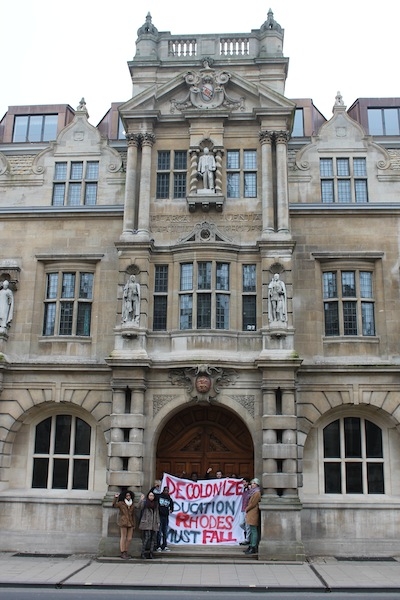Pulling statues down, removing sculptures from display, forcing cultural institutions to break off relations with elements of society that don’t fit your own narrow moral outlook. No, it’s not life in the Islamic State, it’s Britain, which is fast becoming a strange place when it comes to the way culture gets politicised.
The last few months have been busy for an emerging new generation of ‘radical’ protesters, whose targets have been statues, sculptures and museums. First up was another demonstration by the Rhodes Must Fall campaign, started at the University of Cape Town and picked up by students at Oxford University, with the common call to pull down a statue of Victorian colonialist and benefactor Cecil Rhodes, from a building of Oriel College in Oxford and at the UCT campus, along with a more sweeping, if abstract, demand to ‘decolonise the university’. (Students at Cape Town have gone further than their Oxford peers, burning paintings they deemed symbolic of the institutional racism of the university there.) In February, a similar campaign popped up at Cambridge, where student activists passed a motion demanding that a Benin Empire bronze statue of a cockerel, looted by the British in their sacking of Benin in 1897, be taken down from its place in Jesus College and sent back to where Benin used to be: present-day Nigeria. In early March, the college authorities caved in. And one week later, environmentalist protesters celebrated as BP announced it was ending its longstanding sponsorship deal with Tate, after years of dogged protest and interventions by protest groups Liberate Tate and Platform.
Now, although I might risk coming across as ArtReview’s resident apologist for everything from white privilege to colonial expropriation and climate-change denial, there’s something disturbingly regressive about the tendency to demand the stripping out, from the public realm and from public institutions, of any trace of injustice, contradiction or conflict, whether historical or contemporary. What’s particular about such protests is their common attitude that the institutions of culture and academia are places that need to be cleansed, purified of any manifestation of past injustices or present differences of opinion. So the Rhodes Must Fall and Cambridge campaigns turn on the idea that while an academic institution may have once benefited from the iniquities of colonialism, the hand-me-down leftovers of these – in the form of a statue, or a scholarship programme – are, in some almost superstitious way, the continuation of that iniquity. Meanwhile, the continuous hectoring of an institution such as Tate for keeping company with an oil company itself turns on the motif of purification, with its rhetoric of ‘reputational laundering’ and ‘greenwash’, of the gallery becoming tainted by its complicity in making clean its sponsor’s dirtiness. Today’s cultural protesters, it seems, want nothing more than to think public life must be kept pure and innocent, everything boiled down to a simplistic script about ‘how things should be’ – according to them, that is.
That these new, narrow and self-righteous protests should take over so much of public debate is peculiar, since such campaigns struggle to inspire and enthuse anything like a broader public. Rather, they prey on simplistic moralisations that unravel when confronted. To which state, for example, should the Benin bronze actually be returned, since the civilisation that created it is long gone? The broader rhetoric of repatriation of cultural artefacts is itself questionable, suggesting that current nations, peoples or cultures have a sort of ‘blood right’ to objects. So while everyone can comfortably agree that historical European colonialism was a catastrophe for millions, and while wiping the historical record clean might make you feel good about yourself, such backward-looking campaigning has nothing substantial to say about global power and privilege as it exists now. And when it comes to the claims of eco-protesters, there are still some of us who don’t agree that climate change is the worst and biggest problem that society faces right now; that perpetual war, emergency migration and economic stagnation might need addressing with more urgency.
But these new puritans never really want to have a real argument in public, since they are dependent on making symbolic gestures in the view of the media while relying on that other hallmark of puritanism, the ceaseless shaming and castigation of those you don’t agree with, not letting up until everyone concedes to you. That their targets are cultural – artefacts and institutions that don’t fit their intolerant opinionating – also points to how, in the absence of any bigger positive political vision of the future, protest latches on to the local, close-at-hand, easiest to target. That institutions which have a responsibility to a broader cultural debate capitulate at the first sign of controversy only emboldens such protests. The irony is that this isn’t a culture of radicalism, it’s one of conformism – of demanding that everyone submit to the same view, the correct cultural and political script. You might as well close universities, close galleries – since there’ll be nothing left to disagree about.
This article first appeared in the April 2016 issue of ArtReview.
